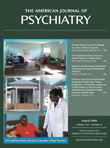To the Editor: Since its publication in 1989, the Yale-Brown Obsessive Compulsive Scale (Y-BOCS
[1] ) has become the gold standard in the assessment of patients with obsessive-compulsive disorder. The Y-BOCS consists of a symptom checklist and a severity rating scale. One of the items on the symptom checklist concerning sexual obsession is “content [that] involves homosexuality.” In response to this item, a Swedish patient filed a complaint to The Ombudsman against Discrimination on grounds of Sexual Orientation, which is a Swedish public agency that was created to address homophobia and discrimination based upon sexual orientation. After investigation, the agency concluded that use of the Y-BOCS should be discontinued because the scale is heteronormative and discriminatory, since sexual obsessions involving heterosexuality
per se is not covered in the checklist, and, according to the Ombudsman, the item concerning homosexual obsessions is placed within a context of criminal and aberrant sexual behavior that is associated with scientific arguments that are unfounded and considered outdated. According to Swedish antidiscrimination laws, use of the Y-BOCS could, therefore, be grounds for legal prosecution. Although this matter has not yet been presented to a court, it will affect the use of the scale in Sweden and might also affect the possibilities of conducting research on obsessive-compulsive disorder overall.
We feel that a quandary has arisen mainly because the Ombudsman does not distinguish between the sexual orientation homosexuality and obsessions about homosexuality as a part of a psychiatric disorder. That is to say, homosexual obsessions on the Y-BOCS are placed in the context of other sexual obsessions because the thought of being gay or lesbian by some patients with obsessive-compulsive disorder is repulsive and undesirable to them, in the same manner that the thought of being a pedophile might become an obsession to other patients.
We argue that the Y-BOCS does not contain data that are biased regarding sexual orientation. Concerning the Ombudsman’s assertion of the Y-BOCS as a heteronormative assessment, our understanding and clinical experience is that gay and lesbian patients with obsessive compulsive disorder never or rarely experience obsessions about heterosexuality, whereas the inverse is fairly common, explaining why obsessions about heterosexuality are not listed.
A clinical situation with an improper use of the Y-BOCS (not stressing that it assesses obsessions, not sexual orientation) might rightly be considered offensive and discriminatory to some patients. Still, we feel that this does not make the Y-BOCS in itself discriminatory. Thus, we pose the following questions to the medical and scientific community: How many in the medical and scientific community feel that the Y-BOCS is, in itself, discriminatory? Have any clinical experiences of gay and lesbian patients with obsessive-compulsive disorder displaying obsessions about heterosexuality been reported?

